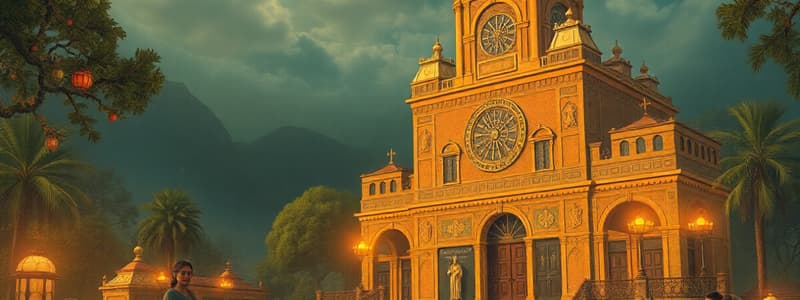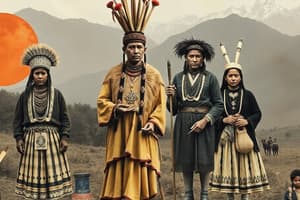Podcast
Questions and Answers
Which statement accurately describes the role of indigenous rights movements in Bolivia?
Which statement accurately describes the role of indigenous rights movements in Bolivia?
- Indigenous rights movements have consistently failed to gain any significant traction.
- Indigenous rights movements have only addressed cultural aspects without touching on land rights.
- Indigenous rights movements have been primarily focused on urban economic issues.
- Indigenous rights movements seek to reclaim indigenous traditions and challenge historical inequalities. (correct)
What does the Bolivian constitution guarantee for indigenous peoples?
What does the Bolivian constitution guarantee for indigenous peoples?
- The right to vote only in local elections.
- Mandatory integration into mainstream culture.
- Self-determination and cultural preservation. (correct)
- Complete control over all national resources.
What has been a significant challenge for Bolivia in the post-dictatorship period?
What has been a significant challenge for Bolivia in the post-dictatorship period?
- Completely eradicating indigenous influence from society.
- Ignoring economic growth in favor of military needs.
- Establishing a single-party political system.
- Consolidating democratic institutions and implementing structural reforms. (correct)
Which factor contributed to the instability in Bolivia as mentioned in the content?
Which factor contributed to the instability in Bolivia as mentioned in the content?
How have recent years impacted Bolivia in terms of social progress?
How have recent years impacted Bolivia in terms of social progress?
Which civilization is known for its advanced urban planning and irrigation systems in pre-Columbian Bolivia?
Which civilization is known for its advanced urban planning and irrigation systems in pre-Columbian Bolivia?
What was a significant consequence for indigenous populations during the Spanish colonial period?
What was a significant consequence for indigenous populations during the Spanish colonial period?
Who played a key role in facilitating Bolivia's independence from Spain?
Who played a key role in facilitating Bolivia's independence from Spain?
What was the original name given to Bolivia upon its independence in 1825?
What was the original name given to Bolivia upon its independence in 1825?
Which economic challenge exacerbated political instability in Bolivia in the 20th century?
Which economic challenge exacerbated political instability in Bolivia in the 20th century?
Which of the following accurately reflects the impact of European agricultural techniques during the colonial period?
Which of the following accurately reflects the impact of European agricultural techniques during the colonial period?
What characterized the early years of the Bolivian republic after independence?
What characterized the early years of the Bolivian republic after independence?
Which indigenous group was present in Bolivia prior to the arrival of Europeans?
Which indigenous group was present in Bolivia prior to the arrival of Europeans?
Flashcards
Military's impact on Bolivia
Military's impact on Bolivia
The military's role in Bolivian politics often caused unrest and instability due to regional conflicts.
Post-dictatorship recovery
Post-dictatorship recovery
Bolivia worked to rebuild after a dictatorship, focusing on strengthening democracy and implementing necessary changes.
Indigenous rights issues
Indigenous rights issues
Bolivian Indigenous groups have faced historical discrimination and loss of land.
Indigenous self-determination
Indigenous self-determination
Signup and view all the flashcards
Indigenous movements
Indigenous movements
Signup and view all the flashcards
Tiwanaku Empire
Tiwanaku Empire
Signup and view all the flashcards
Spanish Colonialism
Spanish Colonialism
Signup and view all the flashcards
Bolivian Independence
Bolivian Independence
Signup and view all the flashcards
Independence Challenges
Independence Challenges
Signup and view all the flashcards
Resource Extraction
Resource Extraction
Signup and view all the flashcards
Demographic Shifts
Demographic Shifts
Signup and view all the flashcards
20th Century Instability
20th Century Instability
Signup and view all the flashcards
Economic Dependence
Economic Dependence
Signup and view all the flashcards
Study Notes
Pre-Columbian Cultures
- Diverse indigenous groups inhabited the Bolivian territory before the arrival of Europeans, including the Tiwanaku, the Muisca, and the Aymara.
- The Tiwanaku Empire rose to prominence, known for its advanced urban planning and monumental architecture (e.g., the Tiwanaku ruins) and the creation of sophisticated irrigation systems.
- These cultures developed intricate social hierarchies and agricultural practices adapted to the varied Andean landscapes.
- Evidence of advanced metallurgy, pottery, and weaving skills is present in archaeological findings.
Colonial Period
- Spanish conquistadors, led by figures like Pedro de Anzures, gradually incorporated the region into the Spanish colonial empire.
- The colonial period brought significant demographic shifts, with indigenous populations experiencing substantial decreases due to disease and forced labor.
- The introduction of European livestock (like cattle, sheep, and horses) and agricultural techniques modified the landscape and the indigenous agrarian system.
- The colonial economy was largely based on resource extraction, particularly silver from mines in Potosi, generating immense wealth for Spain.
- Intense exploitation of both indigenous labor and the resources resulted in significant social and environmental disruption.
Independence Movement
- Growing discontent with Spanish rule and the desire for self-determination fueled the Bolivian independence movement in the early 19th century.
- Simón Bolívar was a key figure in the liberation movement, facilitating Bolivia's independence from Spain.
- The Bolivian struggle was marked by a series of conflicts and political maneuvering among different groups vying for power.
- The newly independent nation, initially named the Republic of Bolívar, was declared in 1825, led by General Antonio José de Sucre.
- The difficulties in establishing a stable government and the division of resources between various factions characterized this period following the declaration.
Modern Political History
- Early years were marked by political instability, conflicts for power, attempts at consolidation, and struggles of economic development.
- The country experienced periods of both authoritarian and democratic governance, with numerous coups d'état throughout the 20th century.
- Economic challenges, like dependence on commodity exports, exacerbated political instability.
- The role of the military in the political system and issues related to regional tensions frequently caused instability in the country.
- Post-dictatorship periods involved efforts by the nation to recover from the past, consolidate democratic institutions, and implement structural reforms.
- More recent years have seen fluctuating periods of economic growth and challenges, along with social progress and resistance to corruption.
Indigenous Rights Movements
- Indigenous groups have historically faced discrimination, marginalization, and land dispossession.
- The Bolivian constitution recognizes and protects the rights of indigenous peoples, including the right to self-determination and cultural preservation.
- Modern indigenous rights movements have gained momentum, with indigenous leaders and organizations playing a significant role in advocating for social justice and land rights.
- These movements sought to reclaim indigenous traditions and cultures and to challenge historical inequalities.
- The cultural identity of indigenous peoples remains a significant part of Bolivian society, although ongoing efforts are required to fully resolve historic issues of inequity.
Studying That Suits You
Use AI to generate personalized quizzes and flashcards to suit your learning preferences.




